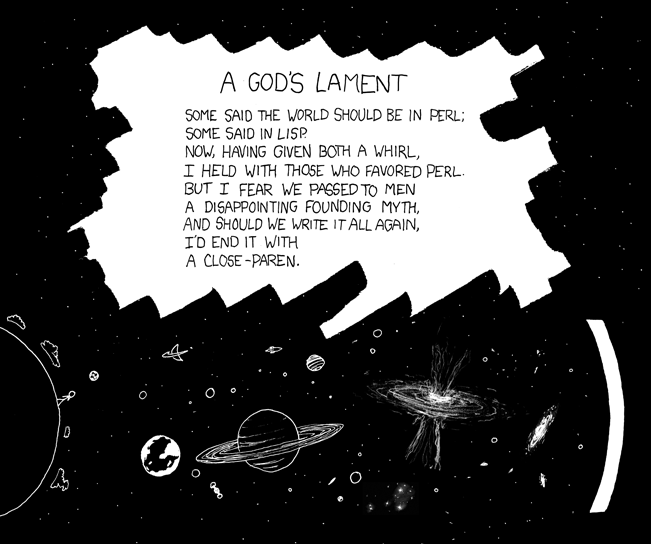

MWF 10:30-11:20am. Davies Auditorium.
Introduction to the concepts, techniques, and applications of computer science. Topics include computer systems (the design of computers and their languages); theoretical foundations of computing (computability, complexity, algorithm design); and artificial intelligence (the organization of knowledge and its representation for efficient search). Examples stress the importance of different problem-solving methods.
The Racket Guide. A description of Racket for people with previous programming experience.
Optional: How To Design Programs (online copy). (buy from Amazon) An introduction to programming using Racket written by the inventors of racket. It assumes no programming background.
The course requirements consist of class attendance, (more-or-less) weekly programming assignments in Racket and occasional written homework and canvas quiz, and two MIDTERMS and a FINAL EXAM. Plan on spending between 6-8 hours per week on the course outside of class. The programming assignments are an integral part of the course.
Please try not to leave the homework to the last minute. You will be more efficient, learn more, have more chance to get help, and generally be calmer and happier if you do the associated reading first and start the programming or other problems early.
The final grade in the course will be based on class participation (e.g., canvas quizzes), your performance on the programming assignments and other homework, and the exams. The weighting of these components will be approximately 1/3rd on quizzes and homework and 2/3rd on exams.
Late work without a Dean's excuse will be assessed a penalty of 5 points per day, based on the day and time recorded by the Zoo electronic submit program. At the end of term, up to 50 points will be deducted from the total lateness penalties your homework has accrued. However, according to Yale College regulations, *no* homework can be accepted after the end of Reading Week without a Temporary Incomplete (TI) authorized by your dean.
If you have a Dean's excuse or a TI, making up missed work may involve alternative assignments, at the discretion of the instructor; please check with the instructor in this case.
Unless otherwise specified, the homework assignments are your individual responsibility. Plagiarism is a violation of University rules and will not be tolerated. You must neither copy work from others (at Yale or elsewhere) nor allow your own work to be copied. You are definitely on the wrong side of the boundary if you give or receive a printed or electronic copy of your or anyone else's work for the course from this term or previous terms.
You are encouraged to ask others for help with the computers and Unix, with questions about Scheme, general questions about the concepts and material of the course, but if you need more extensive help with a program or other assignment, please ask a TA or the instructor for assistance. Working in groups to solve homework problems is not permitted in this course. Please talk to the instructor if you have any questions about this policy.
This semester, we have a dedicated accomodation assistant for Computer Science, Amma. Her contact email is: cpcsaccommodatedexams@yale.edu. Students who would like to use approved testing accommodations in the course should send their letter to Amma (with a copy to stephen.slade@yale.edu) and coordinate with her at that email address. Use the course identifier CPSC 201 in all communication to Amma since she will be working with other CPSC courses.
During my years at Yale, I have had students who were either blind or deaf. They were generally among the best in the class. I want to make you succeed.
| Week | Date | Topic |
|---|---|---|
| 1 | Jan 17, 19 | Introduction. Racket. |
| 2 | Jan 22, 24, 26 | Racket. |
| 3 | Jan 29, 31, Feb 2 | Racket. |
| 4 | Feb 5, 7, 9 | Racket. Computability. |
| 5 | Feb 12, 14, 16 | Computability. |
| 6 | Feb 19, 21, 23 | Boolean functions and Expressions. |
| 7 | Feb 22, 28, Mar 1 | Review for midterm I. Gates and Circuits. |
| Tuesday Feb 27th, 7pm | Midterm Exam - RTBA | |
| 8 | Mar 4, 6, 8 | Computer Architecture. |
| Mar 9 - 24 | Spring Break | |
| 9 | Mar 25, 27, 29 | Strings and languages. |
| 10 | Apr 1, 3, 5 | Review for Midterm. Strings and languages. |
| Tuesday Apr 2nd, 7pm | Midterm Exam - RTBA | |
| 11 | Apr 8, 10, 12 | Compilers. |
| 12 | Apr 15, 17, 19 | Running time of programs. |
| 13 | Apr 22, 24, 26 | Dynamic programming. Review for final exam |
| May 8, 2pm | Final Exam |